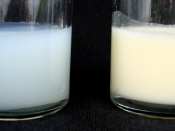www.Storknet.com/articles/ppd.htm ?Postpartum Depression? So you think that motherhood is supposed to be one of the greatest moments of your life and it?s not? Well, you may be suffering from Postpartum Depression.
It wasn?t until the last decade or so that postpartum depression was even noticed. Many professionals still don?t take this seriously. It is experienced by about two-thirds of all new mothers and only diagnosed in 10 to 15 percent of those. Laurence Kruckman, PhD, a professor of anthropology at Indiana University of Pennsylvania points out that we live in a culture with values that stress individualism and toughing things out alone. This shows that maybe the mother doesn?t want anyone to know that she may be suffering from depression and that she wants to deal with it on her own.
Postpartum Depression occurs three to 14 days after the birth. This is not just a ?mood? or ?feeling? of a mother.
Hormones cause this type of depression. Immediately after delivery, high levels of certain hormones decrease dramatically, causing a quick change in the physiological state of her body.
How long will it take to stop? Well, it all depends on how long it takes her to tell someone. So, the first thing you must do is seek help. There are anti-depressants you can take. However, these drugs may find themselves in the breast milk, posing a risk to the newborn. Support groups are an option; talking is one of the best ways to deal with depression. What better way to talk then with others who have the same type of depression? ?Recent research shows that a combination of both talk therapy and antidepressants is best,? says Dr. Kruckman.
This article was very informative. It gave what the problem was, how it worked, and ways to...


